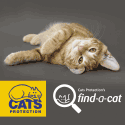Poisonous or dangerous foods
Foods contain all kinds of chemicals which interfere with a cats body. Normally, cats will avoid anything seriously dangerous, but if given food by their owners they may eat it anyway

Can cats tell?
Cats have a good ability to tell what is safe and what is not. Being able to avoid bits of meat that have gone off or are unsafe is a useful instinct for a wild cat. In the domestic environment though, this ability has to work with unfamiliar foods, and sometimes against the encouragement of an owner, and it often fails. As an example, chocolate can be dangerous, even lethal, to cats and if left out, a cat will normally sniff it and leave it alone. However, if a human were to eat a slice of chocolate cake and then offer a spoonful, or finger full, of chocolate cream to a cat, the cat will probably lick it clean. In a similar situation, a cat may not notice the danger of onion in bits of a meat pie, or meaty gravy made with onion.
RELATED PAGES:
Discuss this article in our Cat Forum!
Be a vigilant owner
Whilst you can generally give a cat very small pieces of most human foods without any problems, it is important to be aware that some seemingly harmless foods can be very dangerous. By keeping any 'offerings' down to a minimum, keeping meal treats as raw meats, and feeding a diet of solely prepared cat foods, you can make sure any 'accidental poisonings' are avoided. Some surprisingly harmful foods for cats:Onions
Eating onion or onion additives can cause anemia in cats (loss of red blood cells), although tiny amounts on occasion are not harmful.Bones
Whilst a wild cat would eat almost all of its prey, crunching the bones and all, feeding your cat anything with bones can be dangerous. Even cooked bones could break and splinter, potentially puncturing a cats internal systems.Alcohol
Quite obvious, but worth mentioning. Even small quantities of alcohol can be seriously dangerous for small animals like cats
Surprisingly, cows milk can give cats upset stomachs
Milk
This surprises many owners, but milk contains lactose, which adult cats cannot digest, and may cause stomach upsets. Special lactose-free cat formula milk can be used as an alternative, but water is the only liquid drink cats need.Raisins
Although not fully understood, raisins and grapes contain a toxin which can cause kidney failure in cats and dogsChocolate
A chemical in all types of chocolate, along with caffeine, can affect heart rhythm and in extreme cases cause seizures in cats.Sweets and diet sugars
A sweetener called Xylitol, used in sweets and diet additives, can effect on a cats insulin levels, causing blood sugar problems leading to vomiting, dizziness, seizures, and even liver failure.Yeast
Bread and cakes rise as they cook due to the yeast inside the mixture, but if your cat eats this yeast before the 'rising' has taken place, it could swell inside your cats digestive system, causing pain, and some yeasts may also ferment and produce alcohol. If you are a keen cake baker, don't let your cat lick the bowl.In addition to the above there are many types of food and food additives which humans use that can be harmful to cats, ranging from mild upsets (from tomatoes for instance) to more serious organ failure or nervous system disorders. If in doubt it is best to stick to just small pieces of meat (but not with gravy, which might have onion in!) or avoid human food altogether and give your cat a cat treat after your meal instead.
Feeding and Nutrition
Recent Blog Posts
New 'Think' Pet Sites
25th May 2013
Now joining Think Fish are four new pet sites - Think Animals, Cats, Woof, and Reptiles.
READ MORE










